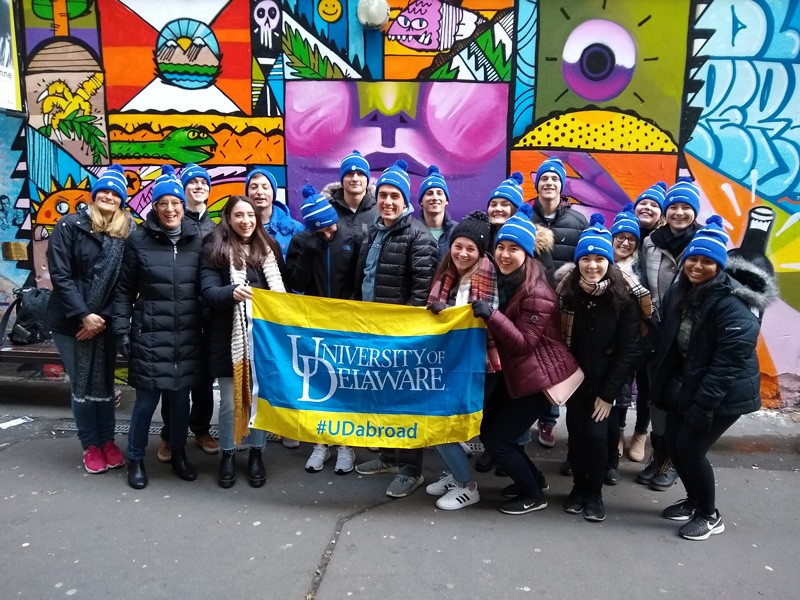Learning in Germany

UD students learn about social impact startups in Berlin and Munich
As the University of Delaware celebrates another successful year of its pioneering study abroad program, 16 students from the Department of Human Development and Family Sciences (HDFS) and Horn Entrepreneurship spent the 2020 Winter Session in Berlin and Munich, Germany.
Throughout the the three-week journey, students met with entrepreneurs, nonprofits, small businesses and philanthropic organizations to better understand social entrepreneurship, which is a field that centers on the creation, delivery and capture of value of new ideas that aim to make a better world.
The class was led by Stephanie Raible, assistant professor in HDFS and Horn, and was supported on-site by Lynn Worden, associate professor in HDFS, which is part of UD’s College of Education and Human Development. This was Raible’s first year leading UD’s study abroad in social entrepreneurship.
“Students sometimes feel like social entrepreneurship is really abstract. It sounds good in theory, but how does this work in real life?” said Raible. “The goal of this program is to show students that social entrepreneurship is real and that people are able to build careers contributing to the greater good.”
Social Entrepreneurship in Germany
After their arrival at Berlin Tegel International Airport, Raible and her cohort of students checked into their hotel and for ten days explored startups and nonprofits that aim to have a transformational social impact.
Social entrepreneurship comes in many different forms. Students met with disability advocates at Sozialhelden (or “Social Heroes”), a nonprofit that targets social problems through fun and innovative public awareness campaigns. They learned about wheelchair accessibility in German cities, including the organization’s open source data project Wheelmap, which was created in 2010 to help the physically disabled plan their days more easily. They visited StartNext, the largest crowdfunding community in German-speaking countries, where students learned about the different ways social entrepreneurs fund their start-ups beyond government funding, corporate funding and grants.
While some of the visits highlighted socially-conscious companies that develop digital tools to solve problems, like Sozialhelden and StartNext, others were a little more rustic. At Textilhafen, a textile recycling shop in Berlin, students explored how old garments are given a second life to help clothe refugees, the homeless and anyone else in need. Clothes are donated at various sites around Berlin — similar to Goodwill or Salvation Army — and transported to the Textilhafen warehouse where rows upon rows of sewing machines will transform many of the garments into new products. Old t-shirts, for example, are cut into strips which can then woven together into blankets.
“I really appreciated participating in hands-on work at Textilhafen,” said Olivia Bulzomi, who graduated at the conclusion of the Winter Session with the social entrepreneurship minor. “Participating in weaving and upcycling t-shirts gave me an appreciation for the work that goes into clothing production, in addition to allowing me to reflect on my own shopping habits.”



